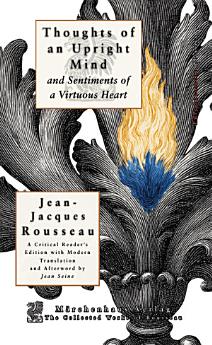Thoughts of an Upright Mind
About this ebook
This book was assembled from Rousseau’s manuscript after his death and first printed in Paris in 1826 by the publisher Fournier-Favreux. It is labeled “Ouvrage inédit” on the title page, indicating it had not been published before. The volume consists of two parts: Pensées d’un esprit droit followed by Sentimens d’un cœur vertueux. Each part contains a series of brief reflections – often only a sentence or two – on topics like honesty, friendship, the nature of human needs, and the importance of kindness. The style is aphoristic and sometimes poetic, more meditative than argumentative. For example, Rousseau writes of how he once found among his lost papers the draft of another work (a curious meta-reference to his own writing). In general, these thoughts flow as if jotted in the privacy of Rousseau’s study. They give glimpses of his views on the “moral sense” (the innate capacity for empathy), on how wealthy societies corrupt character, and on the preciousness of a peaceful conscience. A final note on the title page indicates the book was “printed from the author’s autograph manuscript,” underscoring its authenticity as Rousseau’s own private notes.
While not as famous as Rousseau’s major works, Pensées d’un esprit droit is valued for what it reveals about his philosophy of the heart. It echoes themes he developed elsewhere (such as in The Social Contract and Émile) but in a more personal tone. Readers find here a Rousseau who is quieter and reflective, still championing virtue over society’s vices. The collection never made a big splash in its own time, but today it is included in complete editions of Rousseau’s writings. Scholars and readers see it as worth consulting for Rousseau’s mature insights into ethics and the life of feeling. In particular, it illustrates Rousseau’s lifelong belief that a truly “upright” person lives by inner convictions and sympathy for others. As a posthumous publication it completes the portrait of Rousseau by offering a few more sentences from his pen – a gentle coda of sincerity and moral earnestness to the thinker’s vast oeuvre.











